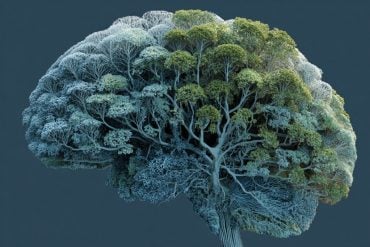Summary: For smokers, the first cigarette of the day is often accompanied by a cup of coffee. Researchers say this may be more than a habit, finding chemical compounds in roasted coffee beans may help quell the effects of morning nicotine cravings.
Source: University of Florida
For some smokers, the first cigarette of the day is just not as satisfying without a cup of coffee. That could be more than just a morning habit: Chemical compounds in roasted coffee beans may help lighten the effects of morning nicotine cravings, University of Florida researchers have found.
In a cell-based study, the researchers identified two compounds in coffee that directly affect certain high-sensitivity nicotine receptors in the brain. In smokers, these brain receptors can be hypersensitive after a night of nicotine withdrawal.
The recently published findings have yet to be tested in humans but are an important step toward better understanding how coffee and cigarettes affect nicotine receptors in the brain, said Roger L. Papke, Ph.D., a pharmacology professor in the UF College of Medicine. Caffeine is coffee’s feel-good ingredient for most people but smokers may get another kind of boost.
“Many people like caffeine in the morning but there are other molecules in coffee that may explain why cigarette smokers want their coffee,” Papke said.

The researchers applied a dark-roasted coffee solution to cells that express a particular human nicotine receptor. An organic chemical compound in coffee may help restore the nicotine receptor dysfunction that leads to nicotine cravings in smokers, the researchers concluded.
The findings have led Papke to a broader hypothesis: One of the compounds in brewed coffee, known as n-MP, may help to quell morning nicotine cravings.
Papke said he was intrigued by the idea that nicotine-dependent smokers associate tobacco use with coffee in the morning and alcohol in the evening. While alcohol’s effect on nicotine receptors in the brain has been thoroughly researched, the receptors’ interaction with coffee has been studied less.
“Many people look for coffee in the morning because of the caffeine. But was the coffee doing anything else to smokers? We wanted to know if there were other things in coffee that were affecting the brain’s nicotine receptors,” Papke said.
The findings, he said, provide a good foundation for behavioral scientists who could further study nicotine withdrawal in animal models.
About this neuroscience research news
Author: Doug Bennett
Source: University of Florida
Contact: Doug Bennett – University of Florida
Image: The image is in the public domain
Original Research: Closed access.
“Coffee and cigarettes: Modulation of high and low sensitivity α4β2 nicotinic acetylcholine receptors by n-MP, a biomarker of coffee consumption” by Roger L. Papke et al. Neuropharmacology
Abstract
Coffee and cigarettes: Modulation of high and low sensitivity α4β2 nicotinic acetylcholine receptors by n-MP, a biomarker of coffee consumption
Smokers report particular appreciation for coffee with their first cigarettes of the day.
We investigated with voltage-clamp experiments, effects of aqueous extracts (coffees) of unroasted and roasted coffee beans on the activity of human brain nicotinic acetylcholine receptor (nAChR) subtypes expressed in Xenopus oocytes, looking at complex brews, low molecular weight (LMW) fractions, and specific compounds present in coffee.
When co-applied with PNU-120596, a positive allosteric modulator (PAM), the coffees stimulated currents from cells expressing α7 nAChR that were larger than ACh controls.
The PAM-dependent responses to green bean coffee were three-fold greater than those to dark roasted coffee, consistent with α7 receptor activation by choline, a component of coffee that is partially degraded in the roasting process.
Coffees were tested on both high sensitivity (HS) and low sensitivity (LS) forms of α4β2 nAChR, which are associated with nicotine addiction.
To varying degrees, these receptors were both activated and inhibited by the coffees and LMW extracts. We also examined the activity of nine small molecules present in coffee. Only two compounds, 1-methylpyridinium and 1-1-dimethylpiperidium, produced during the process of roasting coffee beans, showed significant effects on nAChR.
The compounds were competitive antagonists of the HS α4β2 receptors, but were PAMs for LS α4β2 receptors. HS receptors in smokers are likely to progressively desensitize through a day of smoking but may be hypersensitive in the mornings when brain nicotine levels are low.
A smoker’s first cup of coffee may therefore balance the effects of the day’s first cigarette in the brain.







